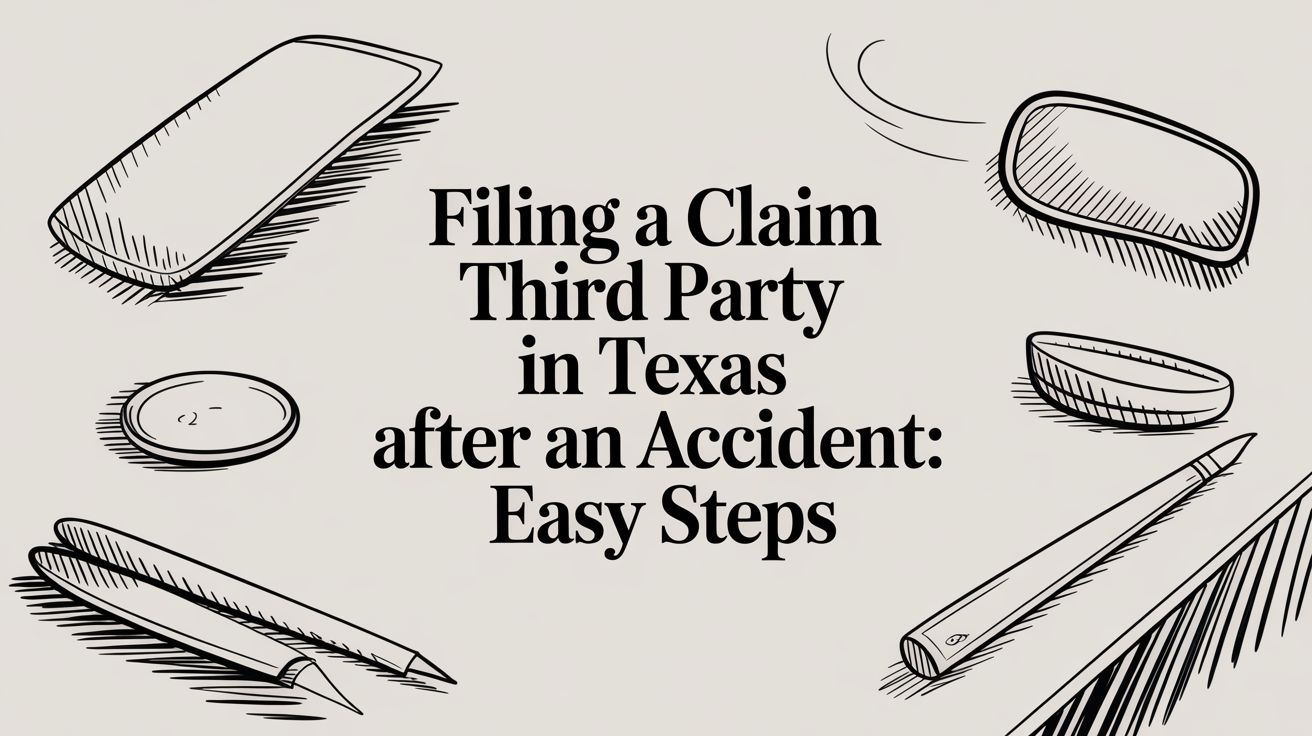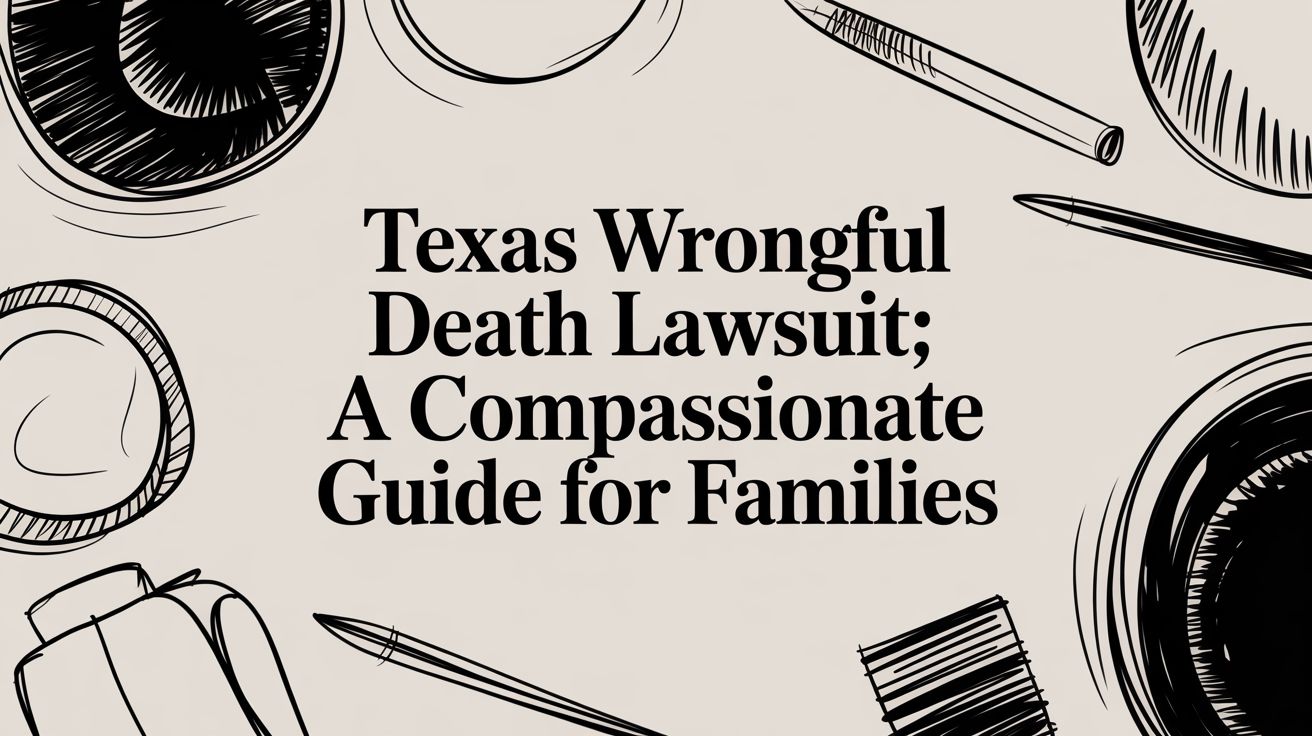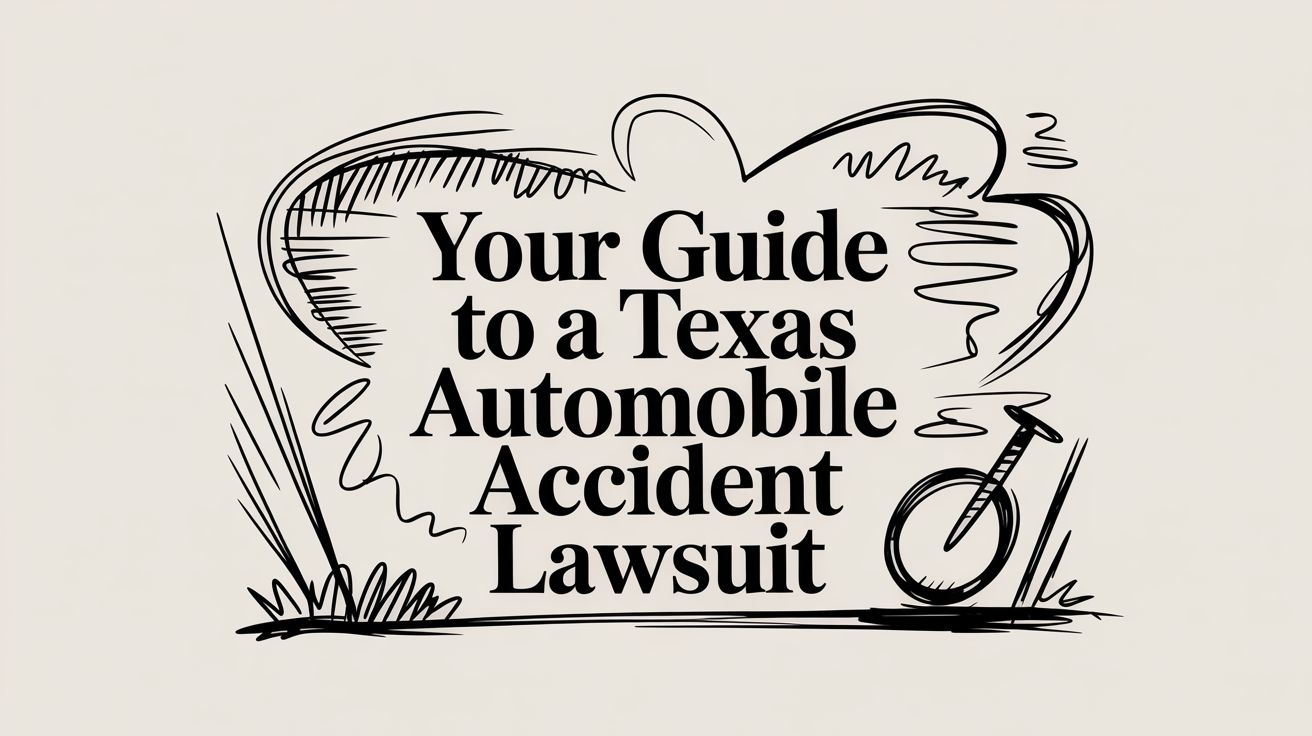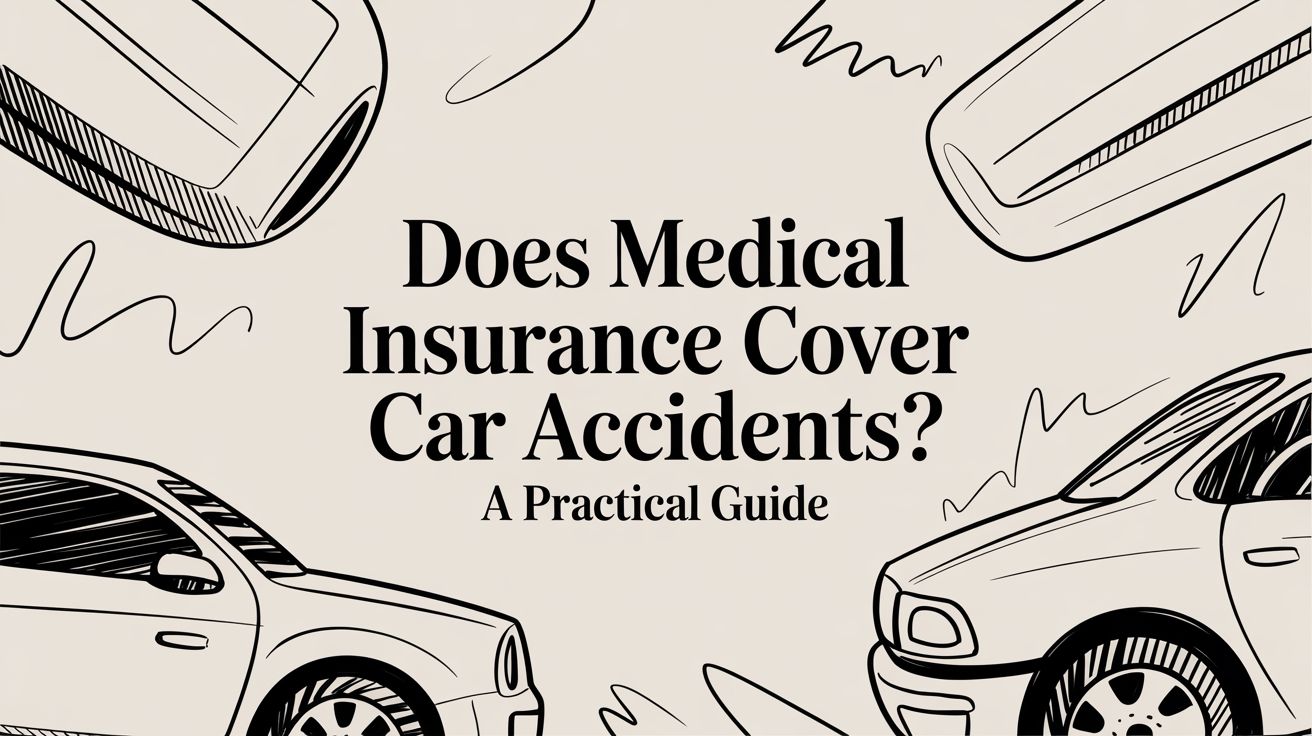A serious accident can change your life in seconds—but you don’t have to face it alone. The secret to a successful negotiation with an insurance adjuster is simple: preparation. And that preparation starts the moment the crash happens—long before you ever get on the phone with them.
Every single step you take to document the scene and your injuries builds the foundation for the compensation you rightfully deserve.
Your First Moves After a Texas Accident
The moments after a car crash, whether on a packed Houston freeway or a quiet Dallas side street, can be chaotic. Your adrenaline is pumping, and it’s easy to feel completely disoriented. But what you do right then and there is absolutely critical for protecting both your health and your legal rights. Knowing what to do lays the groundwork for a solid personal injury claim down the road.
Think of it this way: your negotiation with an insurance adjuster doesn't begin with a phone call. It begins with the evidence you collect at the scene. That initial proof is your most powerful tool.
Safeguard Your Health and Your Claim
Your well-being is, without question, the number one priority. Even if you think you feel fine, getting a medical evaluation is non-negotiable.
- See a Doctor Immediately: Adrenaline is a powerful hormone that can easily mask serious injuries like concussions or even internal bleeding. If you wait to get checked out, you're not just risking your health; you're handing the insurance company an excuse to argue your injuries weren't caused by the accident.
- Follow Medical Advice: Go to every follow-up appointment. Attend every physical therapy session. Sticking to your doctor's treatment plan creates a clear, undeniable medical record that shows just how serious your injuries are.
- Keep Every Record: Save every single bill, receipt, and explanation of benefits from your doctor, the hospital, and the pharmacy. These documents are the hard proof of your economic damages.
"In Texas personal injury law, the burden of proof is on you, the injured party. This means you have to prove the other driver's negligence caused both your injuries and your financial losses. Meticulous documentation from day one is how you build a case they can't tear apart."
Document Everything at the Scene
If you're physically able to, gathering information right there at the accident scene is vital. This evidence is what helps establish fault under Texas's comparative responsibility rules, which are used to determine each driver's percentage of blame.
For instance, after a Houston freeway crash, start taking photos. Get pictures of both cars, any skid marks on the road, the traffic signals, and all property damage. You'll want to exchange information with the other driver, but do not discuss who was at fault. Just get their name, contact info, and insurance details. If there are witnesses, ask for their names and phone numbers. Their unbiased account could be invaluable later.
All this information becomes the backbone of your claim. We've put together a detailed guide that explains exactly how to file a car accident claim in Texas, walking you through each step. By taking these initial actions, you’re not just recovering from a wreck—you are actively building the leverage you'll need when it's time to negotiate with that insurance adjuster.
Decoding the Insurance Adjuster's Playbook
That first call from the insurance adjuster can feel like a relief. They often sound friendly, concerned, and ready to help you get things sorted out fast. But it's absolutely critical to remember who signs their paycheck: the insurance company. Their number one job is to protect their employer's bottom line, which means paying you as little as possible for your claim.
Right away, you can see the problem. Your goal is to get fair compensation to cover your medical treatments, lost time at work, and the very real pain you're going through. Their goal is to close your file for the smallest dollar amount they can. Acknowledging this basic conflict of interest is the first and most important step in protecting yourself.
Common Tactics Adjusters Use
Insurance adjusters are skilled negotiators, and they come to the table with a well-practiced playbook designed to chip away at your settlement. Imagine you were in a wreck on a Houston freeway. You might get a call from an adjuster saying something like, "Let's get this settled quickly so you can put this all behind you." It sounds considerate, but it’s a strategy. They’re hoping you'll agree to a number before you even know the full extent of your injuries or what your future medical needs might be.
Keep an ear out for these common maneuvers:
- Asking for a Recorded Statement: One of the first things they'll likely ask for is a recorded statement about the accident. You are not legally required to provide one. Their goal is to get you on record, hoping you'll say something—anything—they can twist later to minimize your injuries or suggest you were partially at fault.
- Making a Quick, Lowball Offer: A fast settlement offer is almost always a low settlement offer. They're banking on the fact that you're stressed about mounting medical bills and might grab the first amount of money they dangle in front of you. This lets them close the claim before you have time to talk to a lawyer and find out what you're truly owed.
- Downplaying Your Injuries: The adjuster may subtly question how bad your injuries really are or whether the treatment you're receiving is necessary. You might hear comments implying you’re exaggerating your pain or that your doctor is ordering too many tests.
This visual guide breaks down the first moves you should make after an accident. Getting these right from the start builds the foundation for a strong claim before you ever have to speak with an adjuster.
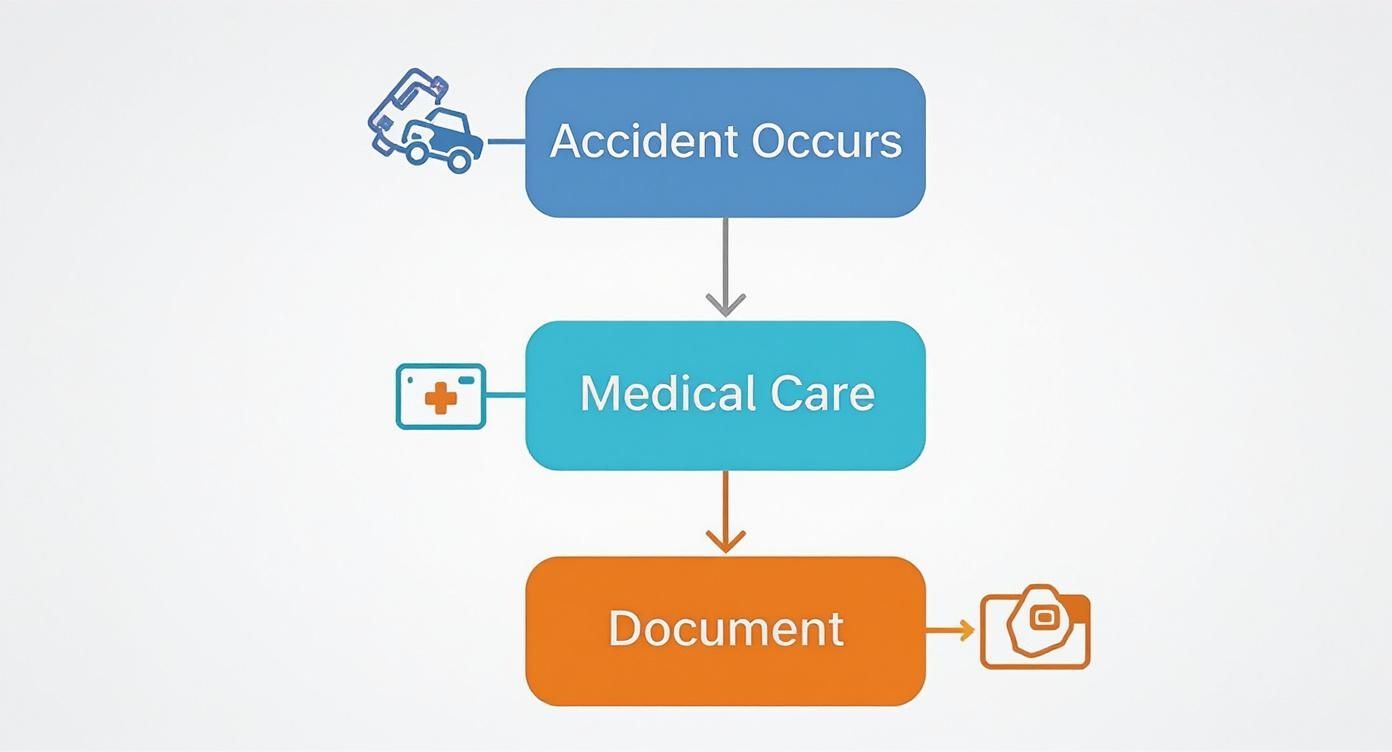
By seeking immediate medical care and documenting every single detail, you're gathering the hard proof needed to shut down an adjuster's attempts to undervalue your claim.
To help you prepare, it's useful to see their tactics laid out and know exactly how to respond.
Common Adjuster Tactics vs. Your Empowered Response
| Adjuster Tactic | Their Goal | Your Empowered Response |
|---|---|---|
| Requesting a recorded statement | To get you to say something they can use against you later. | "I'm not prepared to give a recorded statement at this time. All future communications can go through my attorney." |
| Offering a quick, lowball settlement | To close your claim cheaply before you know its true value. | "I'm still assessing the full extent of my injuries and damages. I won't be discussing settlement figures yet." |
| Asking for a signed medical release | To gain access to your entire medical history to find pre-existing conditions. | "I will provide the relevant medical records for this injury, but I will not sign a blanket authorization." |
| Delaying communication | To frustrate you into accepting a lower offer out of desperation. | Document every attempt to contact them and follow up with a certified letter. This can be evidence of bad faith. |
| Downplaying your pain and suffering | To make you feel like your non-economic damages are invalid or exaggerated. | Keep a detailed pain journal documenting how your injuries impact your daily life. Let the evidence speak for itself. |
Knowing what to expect and having a planned response is your best defense against these well-worn strategies.
Standing Your Ground with an Experienced Negotiator
The negotiation process isn't just a conversation; it's a strategic game. And adjusters have a lot of practice. They handle dozens of claims every month, giving them a serious advantage. In fact, around 95% of personal injury claims are settled before ever seeing a courtroom, which shows you just how important this negotiation phase is. Their first offer is almost always a test—a lowball number to see if you know your rights and are prepared to advocate for yourself. If you come prepared with organized proof of your medical bills, lost income, and pain and suffering, you're in a much stronger position to secure a fair outcome. You can find more insights about insurance settlement negotiations on emrochandkilduff.com.
An insurance adjuster’s kindness is often a professional strategy, not personal concern. Your polite but firm refusal to be rushed or give a recorded statement is not rude—it's smart.
Under Texas law, insurance companies have a duty to act in "good faith," which means they must treat you fairly and honestly. If an adjuster is deliberately misrepresenting the facts, dragging out your claim for no good reason, or flat-out refusing to pay a valid claim, they could be acting in bad faith. Knowing this gives you power. You have the right to push back on unfair tactics and demand what you're owed. You don't have to take their first offer, and you definitely don't have to go through this alone. An experienced Texas personal injury lawyer can take over all communications, shielding you from these tactics and making sure your rights are protected every step of the way.
Calculating the True Value of Your Injury Claim
Never, ever let the insurance company tell you what your claim is worth. Their first offer isn't a gesture of goodwill; it's a business calculation designed to protect their bottom line. To have any chance in a negotiation, you have to walk in knowing the full, true value of everything you've lost.
Under Texas law, you can seek compensation for a huge range of losses. Building a strong case means accounting for every single one of them.

The best way to start is by splitting your losses into two buckets: economic damages and non-economic damages. Getting a handle on the difference is what separates a fair settlement from a lowball offer.
Tallying Your Economic Damages
Economic damages are the straightforward, out-of-pocket costs you've racked up because of the accident. These are the losses with a clear price tag, the ones you can prove with receipts, bills, and pay stubs.
Imagine a catastrophic injury from a truck crash on I-10 in Houston. The immediate costs are obvious, but the financial ripple effects can last a lifetime. To build your case, you need to meticulously track and document everything:
- Current Medical Bills: Every single cost counts. This means the ambulance ride, the ER visit, your hospital stay, surgeries, prescriptions—all of it.
- Future Medical Expenses: A serious injury often requires lifelong care. We’re talking about future surgeries, ongoing physical therapy, medical devices like wheelchairs, or even in-home nursing care. You may need an expert to project these costs over your lifetime.
- Lost Wages: Gather up your pay stubs and employment records. You need to show exactly how much income you've lost because you couldn't work.
- Loss of Future Earning Capacity: What if your injuries mean you can't go back to your old job, or maybe can't work at all? You are entitled to be compensated for the income you would have earned for the rest of your career.
- Property Damage: Don't forget the damage to your vehicle. This includes obvious repairs like auto glass replacement but also the diminished value of your car after an accident.
Every one of these items needs hard proof. Keep a dedicated folder for every single bill, report, and receipt connected to your accident. This isn't just for your own records; it's the undeniable evidence you'll put in front of the adjuster.
Putting a Value on Pain and Suffering
This is where things get more complicated. Non-economic damages cover the intangible losses that hit your quality of life. They don't come with an invoice, but they are very real and absolutely compensable under Texas law.
These damages are meant to cover the human cost of the accident:
- Physical Pain and Suffering: This is for the daily pain, chronic discomfort, and physical limitations your injuries have caused.
- Mental Anguish: Accidents are traumatic. This covers the emotional fallout—the anxiety, depression, fear, and PTSD that so often follow.
- Loss of Enjoyment of Life: This is about your inability to do the things that once brought you joy, whether it’s playing with your kids, gardening, or going for a run.
- Disfigurement: If the accident left you with scars or other physical changes, you deserve compensation for that.
- Loss of Consortium: In cases involving severe injury, this compensates a spouse for the loss of companionship, support, and intimacy.
Because these damages are subjective, insurance adjusters will fight tooth and nail to downplay them. This is where a detailed pain journal, testimony from family and friends, and reports from a mental health professional become incredibly powerful tools to show the real-world impact.
Insurance companies are experts at minimizing what they pay. In fact, specialized negotiation services they hire report success in about 60% of their cases, slicing an average of 30% off the medical bills submitted for claims. They do this by systematically challenging every charge and using their data to justify paying less than what was billed. This is precisely why you need your own comprehensive, well-supported calculation to fight back against their profit-driven tactics.
When you take the time to fully calculate both your economic and non-economic damages, you create a powerful demand package. This isn't just some number you pulled out of thin air; it’s a detailed, evidence-backed case for the compensation you need to put your life back together. A lowball offer from an adjuster simply can’t hold up against a claim built on such a solid foundation. An experienced Houston car accident attorney can be invaluable in helping you gather this proof and ensuring no detail gets missed.
Crafting Your Demand and Opening Negotiations
You've done the hard work of gathering your evidence and figuring out what your claim is truly worth. Now it's time to put that preparation into action. Your first big move is sending a formal demand letter to the insurance company.
Don't mistake this for just another piece of mail. This letter is a professional, evidence-backed argument that sets the tone for everything that follows. It's your chance to show the adjuster you are serious and thoroughly prepared.
A well-written demand letter lays out your case on your terms. It should be clear, logical, and firm, making it impossible for the adjuster to brush aside the facts. It transforms you from a victim into a credible opponent they have to reckon with.

What to Include in Your Demand Letter
Think of your demand letter as the complete story of your case—a comprehensive summary of the accident and its aftermath, supported by all the documentation you've carefully collected. It’s essentially the opening statement in your negotiation.
To be effective, your letter needs to hit several key points:
- A Clear Factual Summary: Briefly explain how the accident happened, making it crystal clear why their insured was at fault. You'll want to reference Texas's fault-based system and point to evidence like the police report or witness statements.
- A Detailed Injury Description: Describe the injuries you suffered, the medical treatment you've gone through, and how it all continues to affect your daily life. This is where you draw a direct line from the crash to your pain.
- An Itemized List of Damages: Break down all your economic damages. List every medical bill, every dollar of lost wages, and any other out-of-pocket expense you've had. Make sure to attach copies of receipts and invoices to back it all up.
- An Explanation of Non-Economic Damages: This is where you explain the human cost of the accident. Articulate the value of your pain and suffering, mental anguish, and loss of enjoyment of life.
- A Specific Settlement Demand: End the letter with a clear, specific dollar amount you believe is a fair settlement. This number should be higher than your bottom line to give you room to negotiate.
Remember, your initial demand is a starting point, not your final word. It anchors the negotiation in your favor and forces the adjuster to respond to your well-supported figure, not just a low number they invent.
Responding to the First Counteroffer
Once your demand letter is sent, the adjuster will review it and come back with a counteroffer. Brace yourself: this first offer will almost certainly be a lowball number. It's a standard tactic. They're testing your resolve, hoping you'll get discouraged and take a fraction of what your claim is worth.
How you respond to this initial offer is critical. The key is to stay calm, professional, and firm.
Do not get emotional or angry. This is a business negotiation, and treating it that way shows you're confident in your position.
For instance, a family dealing with a devastating wrongful death claim in Texas might receive an offer that feels like a slap in the face. The right move isn't outrage, but a calm, written rebuttal. You might write something like, "Thank you for your initial offer. However, it does not adequately account for the full extent of our economic losses and the profound suffering our family has endured. Please review the detailed documentation of future lost income and the expert reports we provided."
This kind of response immediately re-centers the conversation on the facts. It puts the ball back in their court, forcing the adjuster to justify their low number against your hard evidence. You can then counter their offer with a logical argument and a revised (but still strong) demand to move the negotiation forward.
This back-and-forth is normal. But if the adjuster digs in their heels and refuses to negotiate in good faith, that’s a clear sign you need a Texas personal injury lawyer to step in and escalate the fight.
Dealing with these tactics is exhausting when you should be focused on healing. The Law Office of Bryan Fagan, PLLC, can handle this entire process for you. We will craft a compelling demand, counter every lowball offer, and fight for the full compensation you are owed. You don't have to face them alone.
When Negotiations Stall or Your Claim Is Denied
Getting a denial letter or a "final" offer that's laughably low can feel like hitting a brick wall. It’s a tough moment, and honestly, it’s designed to be. The insurance company is banking on you feeling defeated and just walking away.
This is exactly when your persistence becomes your greatest weapon. So many people give up at this stage, but the truth is, a solid appeal or a firm refusal to accept an unfair offer can completely turn things around. This is not the end of the road; you still have options.
The Power of a Formal Appeal
A claim denial isn’t a final judgment. Think of it as an invitation to come back swinging with more evidence. The formal appeals process is there for a reason, and you absolutely shouldn't ignore it.
It's a surprising statistic, but while over 99% of people never bother to appeal a denied claim, the data shows that more than 50% of those who do appeal end up getting a successful outcome. It just goes to show that persistence, when backed by solid proof, really does pay off. You can discover more insights about insurance appeal success rates on altieriinsuranceconsultants.com. Having a professional guide you through this can make a world of difference, correcting errors and applying the right legal pressure.
Understanding Comparative Responsibility in Texas
When talks hit a standstill, adjusters love to pull out the comparative responsibility card. It’s also known as comparative fault, and it’s a big deal in Texas. Under state law, if you’re found to be partially at fault for an accident, your final settlement gets reduced by that percentage. For example, if you have $100,000 in damages but are found 20% at fault, your award is cut down to $80,000.
Adjusters are experts at using this to their advantage. They will try to pin blame on you—fairly or not—just to justify a lower payout. They might twist something you said in an early phone call or creatively interpret the police report to argue you were partially responsible, even when it’s obvious the other driver was negligent.
A classic Houston scenario is an adjuster claiming you were speeding through an intersection, even with zero evidence to back it up. Their only goal is to plant a seed of doubt, chip away at your claim's value, and hope you'll cave and accept their reduced offer.
Fighting these accusations requires a powerful, evidence-based counter-argument. This is often the point where having a skilled legal advocate in your corner becomes non-negotiable.
When to Stop Negotiating and Call a Lawyer
If you find yourself in any of these situations, it's a huge red flag that it’s time to stop the DIY approach. Going it alone from here could cost you dearly.
It's time to bring in a professional when:
- Your claim is flat-out denied. A total denial needs a formal, legally sound response that an attorney is best equipped to draft.
- The adjuster starts playing the blame game. If they're trying to pin partial fault on you without any real basis, you need an advocate to shut that down.
- The "final offer" won't even cover your medical bills. A lowball offer that leaves you with debt is a sign of bad-faith negotiating, plain and simple.
- The adjuster goes silent. When they stop returning your calls or emails, they’re just trying to wear you down. A lawyer can force them back to the table.
An experienced Texas personal injury lawyer can take over all communication, file a powerful appeal, and, if it comes to it, file a lawsuit to show the insurance company you mean business. This move immediately dials up the pressure and makes them take your claim seriously. For a deeper dive, you can learn more about when to hire a personal injury lawyer in our detailed guide.
You've fought hard to get this far. Don't let an insurance company’s stall tactics cheat you out of the compensation you rightfully deserve.
Common Questions About Insurance Negotiations
Going up against an insurance company brings up a ton of questions. When you’re supposed to be focused on healing, the last thing you need is more confusion. Let's clear the air and give you some straight answers to the questions we hear most often from our clients here in Texas.
Should I Give a Recorded Statement to the Insurance Adjuster?
Absolutely not. We tell every client to politely refuse, and here's why: Adjusters are pros at asking tricky, leading questions. Their goal isn't to get your side of the story; it's to get you on record saying something—anything—they can use to hurt your claim later.
They might try to get you to downplay your injuries ("So you were feeling well enough to go to the store?") or even unintentionally admit you were partially at fault. You have no legal obligation to give a recorded statement to the other driver's insurance company. Just tell them you'll be communicating in writing or through your attorney. It's a simple move that protects you from having your own words twisted against you.
How Long Do You Have to File a Personal Injury Claim in Texas?
This is a big one. In Texas, the statute of limitations for most personal injury cases is just two years from the day you were hurt. It's a hard deadline. If you try to file a lawsuit even one day past that two-year mark, the court will almost certainly throw your case out. You'll lose your right to compensation forever.
That's why moving quickly is so critical. Evidence gets lost, witnesses move away or their memories fade, and that two-year clock starts ticking immediately. Getting a Houston car accident attorney involved early on is the single best way to make sure every deadline is hit and your rights are protected from day one.
A "final offer" from an insurance adjuster made early in the process is rarely ever final. It's a calculated tactic to see if you'll accept a low settlement out of pressure or frustration.
What if the Adjuster Says Their First Offer Is Final?
Don't fall for it. This is one of the oldest tricks in the adjuster's playbook. Their job is to settle your claim for as little money as possible, and creating a false sense of urgency is a key part of their strategy. Don't let them bully you into taking a lowball offer that won't even cover your medical bills.
Instead of getting frustrated, see it for what it is: a negotiation tactic. Your move is to respond calmly and professionally. Lay out the facts again. Remind them of your documented medical costs, your lost income, and the real-world impact of your injuries. Explain exactly why their offer is unacceptable and your demand is fair. If they still won't budge from an unreasonable number, it's a huge red flag that they aren't negotiating in good faith—and it's time to escalate. While we're focused on negotiation, you might have other common insurance questions that can be answered in a general FAQ.
When Should I Hire a Lawyer to Handle Negotiations?
While it’s always smart to get a free consultation early, there are definite moments when hiring a lawyer becomes non-negotiable. The second you feel like you're in over your head, being stonewalled, or pressured by an adjuster, it's time to call for backup.
You absolutely need to bring in a lawyer if:
- Your injuries are serious, such as a catastrophic injury, or will require long-term care.
- The insurance company is trying to pin the blame on you or has flat-out denied your claim.
- The settlement offer they've made doesn't come close to covering your medical bills.
- Your case is complex, like those a truck crash lawyer Houston handles, or involves a wrongful death.
A seasoned personal injury attorney takes over all the stressful communications, shielding you from the adjuster's games. We step in and fight for the full compensation you're actually owed under Texas law. If you're wondering what to look for, our guide on how to choose a personal injury lawyer can help you make an informed decision. You don't have to face this alone.
A serious accident can turn your world upside down, but it doesn't have to dictate your future. At The Law Office of Bryan Fagan, PLLC, our job is to stand up to the insurance giants and fight for the resources you need to rebuild your life. Recovery is possible, and legal help is available.
Schedule your free, no-obligation consultation today by calling us or filling out our online contact form. Let us be your advocates.


